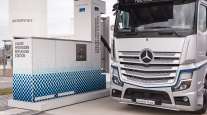Staff Reporter
Western State Coalition Seeks Partners in Heated Hydrogen Hub Race

[Stay on top of transportation news: Get TTNews in your inbox.]
Calling on private investors, Wyoming Gov. Mark Gordon is urging key stakeholders to explain in a web survey what role they would play in a four-state Western regional hydrogen hub.
Hydrogen transporters, users, producers and storage providers are being encouraged to say what their plans are to participate in the Western Inter-States Hydrogen Hub, created in February by a memorandum of understanding signed by Gordon and the governors of Colorado, New Mexico and Utah.
“Hydrogen projects will not be developed without major investment and buy-in from private companies,” Gordon noted. “While our four states have worked out the parameters of our joint efforts, it is now time to find out what projects the public and industry will find feasible.”
Going in its favor, the Western states’ hydrogen hub contends its location offers high-quality wind, solar, biomass and other energy resources, a sophisticated oil and natural gas industry, a robust energy transportation infrastructure, established carbon management infrastructure, favorable geology, and world-renowned national laboratories and universities.
“Utah’s pioneering spirit has always served us well, and as we explore new technologies for diversifying our energy sector, like hydrogen, we will ensure our state always has affordable and reliable energy,” Gov. Spencer Cox said. “However, these efforts do not advance alone — industry partners and a talented workforce make these big ideas feasible, and we’re certain Utah can find that industry and that talent.”
New Mexico Gov. Michelle Lujan Grisham said her state is ready to engage with partners. “A regional hydrogen hub requires coordination not only among states, but among our valuable stakeholders as well,” she added.
The call for stakeholder input is in a “request for expression of interest” in a website survey at rangecollaborative.org. Representatives chosen by each Western governor formed an executive committee that contracted with the nonprofit Rocky Mountain Alliance for Next Generation Energy to evaluate projects and partners.

Survey results will guide preliminary analysis and factor into funding requests. The Western hydrogen hub is competing against other multistate regional efforts for federal infrastructure dollars.
The U.S. Department of Energy has $8 billion in grant funding to develop at least four regional hydrogen hubs for production, processing, delivery, storage and end usage.
Vying for funding is a six-state Northeast hydrogen hub formed in March among neighbors sharing the Interstate 95 freight corridor. New York Gov. Kathy Hochul announced Aug. 25 that Maine and Rhode Island joined the N.Y.-led hydrogen hub that also includes Connecticut, Massachusetts and New Jersey. This effort has attracted partners from 20 hydrogen technology equipment makers, 14 private sector industry leaders, 12 utilities, 10 universities, seven nonprofits, three state agencies and two transportation companies.
In late July, a West Virginia hydrogen hub coalition hosted an industry day to determine next steps with Gov. Jim Justice and U.S. Sens. Shelley Moore Capito and Joe Manchin, chair of the Senate Energy and Natural Resources Committee.

Manchin
“With our abundant energy sources and strong partnerships, West Virginia is uniquely situated to develop an innovative hydrogen hub,” Manchin remarked.
Justice declared he was proud to be on the team “working to land” a hydrogen hub there. “In our state, energy production is part of our heritage and our history. Now, we want a hydrogen hub to be part of our future so West Virginia can continue to be an energy powerhouse for America,” he said.
Some 10 million metric tons of hydrogen are produced in the United States yearly mainly from natural gas through steam methane reforming. DOE is interested in alternative hydrogen production using electrolysis technology (electricity forming hydrogen from water), nuclear, solar and wind.
Want more news? Listen to today's daily briefing below or go here for more info:




